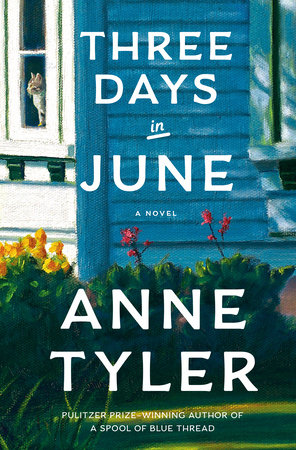READERS GUIDE
Turning her perceptive eye to a fraught wedding weekend, Pulitzer Prize–winning novelist Anne Tyler explores the wry realities of happily ever after in Three Days in June. Narrated by Gail Baines, the sixty-one-year-old mother of the bride, the nuptial story is interwoven with Gail’s memories of her own marriage, which ended in divorce. To make matters worse, while the bride and bridesmaids are enjoying a day of beauty treatments, Gail is being ousted from her job as a private-school administrator and then comes home to find her ex-husband expecting to stay with her (with his foster cat in tow, of course). What unfolds over the subsequent hours is both poignant and tragicomic when the groom’s trustworthiness is called into question. At every turn, Tyler deftly illuminates the delicate strands that connect human vulnerability with the quest for love.The questions that follow are designed to enrich your book club’s discussion of Three Days in June. We hope they enhance your experience of this endearing novel from one of America’s most beloved writers.
Questions and Topics for Discussion
1. Three Days in June opens with a question for you, the reader: “People don’t tap their watches anymore; have you noticed?” How does Gail’s voice continue to engage you throughout the novel? How does she explore the question of timekeeping as she describes the aspects of her life that are fleeting and the aspects that endure?
2. To what extent is Gail’s identity defined by her job? Have her roles as mother, daughter, and wife provided her with the same level of confidence as the work she performed for Marilee Burton?
3. What were your first impressions of Max? On their wedding day, were Max and Gail a good fit? How did your perceptions of their marriage shift as the details unfolded?
4. Did you believe Kenneth’s story about Carla?
5. Is Debbie’s generation stronger or more vulnerable than Gail’s? How have the expectations for adulthood and womanhood changed since your mother’s generation? In what ways does Gail’s relationship with her own mother, Joyce, come full circle? What did Gail teach Debbie (by example, or not) about becoming a fulfilled woman?
6. Debbie goes to great lengths to make sure that Max wears an acceptable suit. Sophie uses an index card to keep the toast makers in order. How did you react to the novel’s carefully drawn portrayals of public appearance and the rituals associated with weddings? Ultimately, is a perfect wedding a predictor of a happy marriage?
7. Gail tells us, “Sometimes when I find out what’s on other people’s minds I honestly wonder if we all live on totally separate planets” (p. 104), using her rebuffing of Jared as an example. Is she honest with herself, and with us, as she reflects on the turning points of her life? Is she more perceptive than she admits?
8. Do Max, Gail, and Debbie have a stronger family than Rupert, Sophie, Kenneth, and Elizabeth? How will Debbie fare with in-laws who are so different from her parents?
9. When Gail was dating Max, he thought she’d hung the moon. Why did he think that? Was it more a statement about him, or about her? What is the source of her perpetual self-doubt?
10. Over those three days in June (One: Day of Beauty, Two: D-Day, and Three: The Day After), what does Gail lose, gain, or regain?
11. Gail introduces us to Andrew Mason on page 1145. Is he a problem, or is he a symptom of a problem?
12. Both Gail and the cat (whom she temporarily names Celine) are going through a time of transition. What else do they have in common?
13. How does Three Days in June add a new dimension to the portrayals of love and marriage in previous books by Anne Tyler that you have read?
Suggested Reading
Ore Agbaje-Williams, The Three of UsDolly Alderton, Good Material
Kevin Kwan, Lies and Weddings
Claire Lombardo, Same as It Ever Was
Alice McDermott, At Weddings and Wakes
Maggie O’Farrell, The Marriage Portrait
Jane Pek, The Rivals
Richard Russo, Somebody’s Fool
Dani Shapiro, Signal Fires
Elizabeth Strout, Tell Me Everything



















